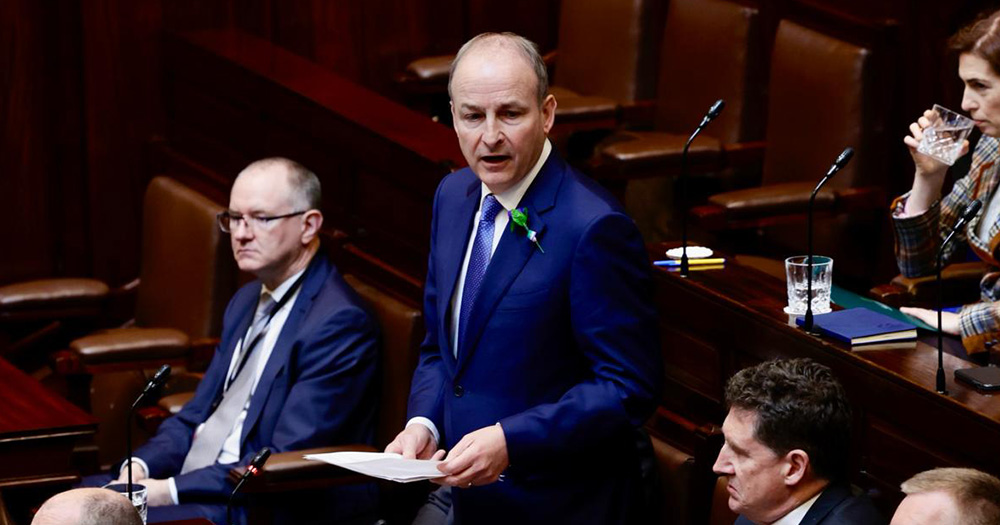Fianna Fáil leader Micheál Martin has named a new cabinet of government ministers after officially being elected Taoiseach by a vote of 95 to 76. The appointments came on the afternoon of Thursday, January 23, one day later than expected due to continued disorder in the Dáil that led to its suspension.
While the new ministers were approved by the rest of the TDs and welcomed by members of the opposition, criticism has emerged over the lack of gender balance. Only three out of 15 cabinet ministers are women, four when Chief Whip Mary Butler is included.
Social Democrats TD Jennifer Whitmore highlighted the issue, saying: “There are now as many men named James in the Cabinet as there are women.”
“Fianna Fáil and Fine Gael pay lip service to increasing women’s representation in politics. They just don’t believe in promoting them when they get elected,” she continued.
The TD also noted that the Dáil has the worst gender balance of parliaments in western Europe, adding that “Government parties have reverted to type – creating a cosy boys’ club”.
Fianna Fáil councillor Rachael Batten expressed similar criticism, saying that she believed women had been “sidelined” in the current cabinet.
“As a woman in politics, and as a mother, I find it difficult to accept that we continue to tell our daughters that there is an equal playing field in politics when the evidence stands in stark contradiction.
“We need stronger policies and leadership that reflect the realities faced by women in society and create the conditions for true gender equality in our political institutions.”
The new government line-up is as follows:
Taoiseach: Micheál Martin
Tánaiste and Minister for Foreign Affairs, Defence and Trade: Simon Harris
Minister for Finance: Paschal Donohoe
Minister for Public Expenditure, Infrastructure, Public Service, Reform and Digitalisation: Jack Chambers
Minister for Enterprise, Tourism and Employment: Peter Burke
Minister for Justice, Home Affairs and Migration: Jim O’Callaghan
Minister for Education: Helen McEntee
Minister for Transport, Environment, Energy and Climate: Darragh O’Brien
Minister for Children, Disability and Equality: Norma Foley
Minister for Arts, Media, Communications, Culture and Sport: Patrick O’Donovan
Minister for Health: Jennifer Carroll MacNeill
Minister for Agriculture, Food, Fisheries and the Marine: Martin Heydon
Minister for Housing, Local Government and Heritage: James Browne
Minister for Social Protection, Community and Rural Development and the Gaeltacht: Dara Calleary
Minister for Further and Higher Education, Research, Innovation and Science: James Lawless
Attorney General: Rossa Fanning
There have also been four Super Juniors appointed, who are additional Ministers of State that have permission to attend cabinet but not to vote. They are:
Minister of State attending Cabinet with responsibility for Disability: Hildegarde Naughton
Minister of State attending Cabinet with responsibility for Food Promotion, New Markets, Research and Development: Noel Grealish
Minister of State attending Cabinet with responsibility for International and Rural Transport, Logistics, Rail and Ports: Seán Canney
Minister of State attending Cabinet with responsibility for Mental Health: Mary Butler (also serving as Government Chief Whip)
On Thursday evening, President Michael D. Higgins officially approved the new government by delivering seals of office to the new senior ministers at Áras An Uaachtaráin. The Programme for Government was also ratified, which contains various commitments to progressing LGBTQ+ rights, including introducing a ban on so-called ‘conversion therapy’, modernising incitement to hatred legislation, developing compassionate and inclusive gender healthcare services, the full commencement of the Assisted Human Reproduction Act, and stronger regulation of online spaces to combat disinformation.
However, many key issues have been excluded. The Programme for Government does not feature any commitments to introducing a simplified process for legal gender recognition for those aged 16 and 17, explicit protections for intersex people, teacher training on LGBTQ+ topics, or updates to the Equality Acts.
© 2025 GCN (Gay Community News). All rights reserved.
Support GCN
GCN is a free, vital resource for Ireland’s LGBTQ+ community since 1988.
GCN is a trading name of National LGBT Federation CLG, a registered charity - Charity Number: 20034580.
GCN relies on the generous support of the community and allies to sustain the crucial work that we do. Producing GCN is costly, and, in an industry which has been hugely impacted by rising costs, we need your support to help sustain and grow this vital resource.
Supporting GCN for as little as €1.99 per month will help us continue our work as Ireland’s free, independent LGBTQ+ media.
